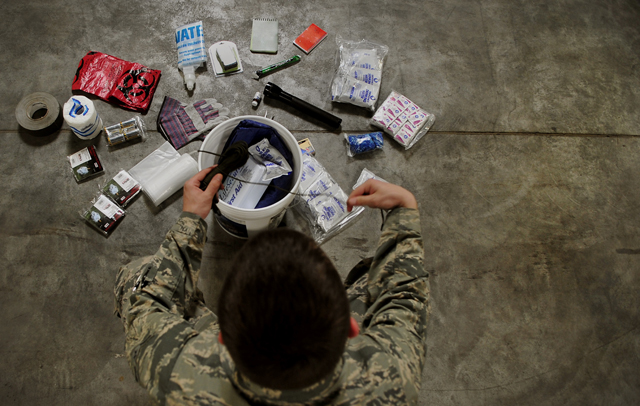
It’s the morning of Aug. 28, 2005 — people awake to sounds of faint screams and echoes of buildings collapsing. A sense of panic and fear lingers in the air as 175 mph winds and masses of water engulfed 90,000 square miles of land. Outside, one of the five deadliest hurricanes in U.S. history has reached the southeast and midwest of the continent. The hurricane eventually killed over 1,000 people and caused more than $100 billion in property damage.
With natural disasters like this, it’s important to work together as individuals, families and ultimately a community to stay prepared for any possible tragedy. Although natural disasters cannot be prevented, steps can be taken to mitigate damage, injuries and possibly eliminate them altogether.
The PrepareAthon! is a presidential directive for all members of the Department of Defense to participate in through drills, informational discussions and overall preparedness at home and in the workplace. This year’s focus is natural disasters.
Civil Engineer Squadron emergency management Airmen, the Red Cross and the Army Office of Emergency Management are working together for Ramstein’s first PrepareAthon!. They will join to provide an information booth where they will offer guidance on how to build emergency preparation kits and answer questions on how to better prepare homes for unexpected emergencies on April 30 at the Kaiserslautern Military Community Center.
Tech. Sgt. Bradley Iseminger, 786th CES noncommissioned officer in charge of plans and operations, said America’s PrepareAthon! campaign calls on workplaces, schools, houses of worship, community based organizations, institutions of higher education and individuals and families to take action to get and stay prepared and build resiliency.
“Emergencies can happen at any time in any place,” Iseminger said. “Being prepared for disasters is a shared responsibility; it takes the whole community working together to effectively prepare for, respond to and recover from the destructive forces of nature and other emergencies and disasters.”
The agencies will provide information, guidance for emergency preparedness, answer questions and hand out lists of items to construct kits for homes and offices that will ensure readiness in the event of a disaster.
“It’s important for individuals and families to keep a kit of supplies in case of an emergency,” Iseminger said. “Items we suggest for the kits are: food, canned and dry goods, flashlights, batteries, a severe weather radio, towels, water, hygiene items — anything you would need to sustain yourself and family for 72 hours without government assistance. The items are not really expensive and it’ll pay dividends in the long run.”
Though Germany may not be a high-risk area for natural disasters, they are not unheard of. Being prepared is important because there is still a potential for a tragedy to occur.
“The biggest thing here is extreme weather events have increased in frequency in the last 50 years and are expected to become more common, intense and costly,” said Airman 1st Class Robert Ridgway, 786th CES plans and operations. “Last year in Germany, we had a tornado. A lot of people weren’t prepared and didn’t know we could have that kind of disaster here, so some people weren’t sure what to do. Our job is to get the information out there so more people are prepared.”
The cost of being prepared can be miniscule compared to the cost of damages when readiness is not made a priority.
“In 2013, deadly weather caused more than $8 billion in property damage,” Ridgway said. “According to the Insurance Information Institute, an estimated 25 percent of all businesses were affected by a major disaster and never reopened. Failure to prepare for an extreme weather event cost the U.S. $1.15 trillion in economic losses from 1980 to 2010, and could cost another trillion dollars in the future.”
The 786th CES emergency management Airmen, the Red Cross and the Army Office of Emergency Management aim to provide as many tools as necessary to help ensure that future loss of life and property damage are less severe than that of Hurricane Katrina or any other devastating past disasters.


